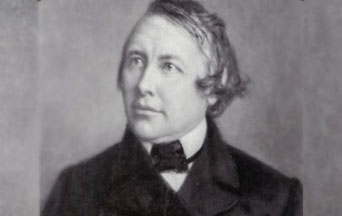
Photo: © George Peter Alexander Healy, CC BY-SA 4.0
In time, the controversial French education law passed in 1850 acquired the name of its sponsor, Frédéric Alfred Pierre, Count de Falloux.
After an intense battle with pamphlets and newspaper polemics, the Chamber of Deputies debated the Falloux law. For two months, it was fiercely attacked from both sides. Supporters of the University system criticized the government for seeking to retreat from a position they had held since the time of Napoleon. Ultramontane Catholics argued that accepting the bill would be a complete capitulation by former members of the old Catholic Party.
Nonetheless, the bill’s opponents in the Chamber of Deputies were relatively few. Stalwart support outside the Chamber increased its supporters’ determination not to waver in the fight. Such opposition required former Prime Minister Adolphe Thiers, the Count de Montalembert and the absolute majority to work ceaselessly to prevent rejection of the bill. This process necessarily forced them into contradictions, showing the weakness of their positions.
Thus, Montalembert openly announced in a speech that he decided to sheath his sword as the champion of Catholicism. Indeed, he no longer enjoyed the confidence of Catholics.
He opened this speech with a declaration of his work for the Catholic cause.
“Gentlemen, I waged war and loved it. I made it longer and perhaps better than most of those who today criticize me for having ceased it.”
Then, the one-time Catholic stalwart tried to justify his embrace of liberal positions.
“But I did not believe that war was the country’s first necessity. On the contrary, I think that in the face of a common danger and the grave and dire circumstances in which we are, and given the dispositions we see in people who we used to regard as adversaries, the first of our duties is to correspond to these new dispositions. For a year now, I have consecrated all the activity and devotion of my soul to this laudable thought.”
Eternal and Natural Law: The Foundation of Morals and Law
Montalembert then tried to persuade his former followers to take the road of compromise.
“Yes, the lessons of events were not lost on our adversaries more than they were for us. Everyone had something to learn and apply. After unforeseen circumstances that we considered catastrophic, our adversaries of the day before reached out to us. Should we repel their hand? No. If I had done so, it would have been the most reprehensible act of my life.
“True, these men did not believe all that we believe, nor did they want all we do. But they now believe in the danger they denied yesterday, a danger we foresaw. Like us, they want a remedy for that danger; they want the salvation of society and have invited us to work for it with them. We accept the invitation with the readiness of a heart devoted to the homeland and society.”
Further on, he painted the Catholic cause as lost.
“After the shipwreck, we find ourselves on a fragile plank that separates us from the abyss. Should we begin yesterday’s struggles again without an imperious necessity? Should we repel the hand we offer each other? Should we resurrect all recriminations and resentments, even the most legitimate ones? No. I don’t think so. I do not believe it; I did not want it, did not do it, and do not regret it.”
Curiously, the Count then attempted to paint support for the compromise bill as an act of virtue.
 Learn All About the Prophecies of Our Lady of Good Success About Our Times
Learn All About the Prophecies of Our Lady of Good Success About Our Times
“That is why I dare say that, despite its imperfections, the law we present to you is a sacred work—sacred by the spirit that dictated and inspired it: a spirit of union, peace, conciliation, and patriotism. We and our former adversaries have been working on it for a year. We started this work remembering our old struggles but only to encourage us to endure boredom and overcome the difficulties, contradictions and bitterness inseparable from such a work. To this end, we spared no affection or contradiction. Unfortunately, we sacrificed only the spirit of contention, bitterness and exaggeration inseparable from prolonged struggles, even the most legitimate ones. As for me, I have given my life, courage, and twenty years of perseverance and devotion to the cause of freedom for the Church. As a last tribute, I offer you the ingratitude, unpopularity and injustice this law has caused to my party.”
Despite the minority’s efforts, the Falloux law passed 399 in favor to 237 against. This small difference, and the fact that Montalembert acknowledged its unpopularity among Catholics, clearly shows the strength of that minority.
As at other times, Thiers’ intervention was decisive for the victory of the Count de Falloux’s faction. Before the projected bill was discussed, Thiers said he wanted to hide under a table when the Chamber of Deputies debated provisions referring to the Jesuit schools. To everyone’s surprise, he later came to the rostrum to defend the Society of Jesus, which he had always opposed. The left and University system’s supporters did not miss that opportunity to expose his contradictions. They accused him of siding with the Society. He replied in a jocular vein, smiling under prolonged general hilarity: “Yes, I confess: I am a Jesuit. Agreed.”
Thus, on March 15, 1850, the Falloux law passed, thanks to the help of the Catholic Party’s fiercest opponents.

